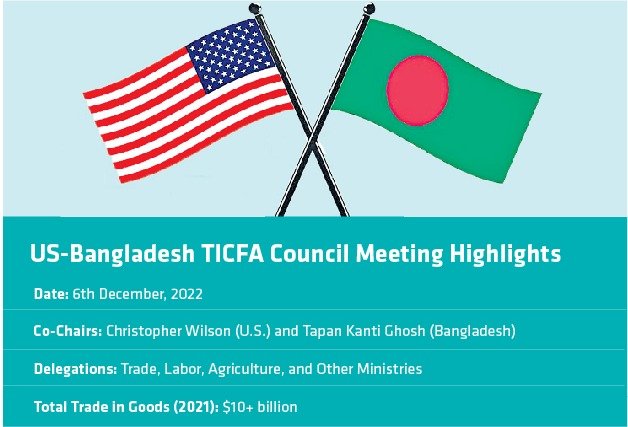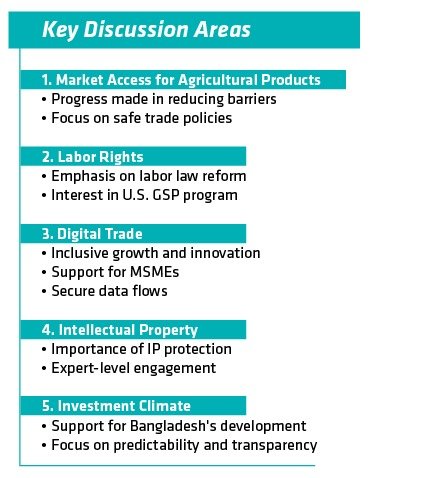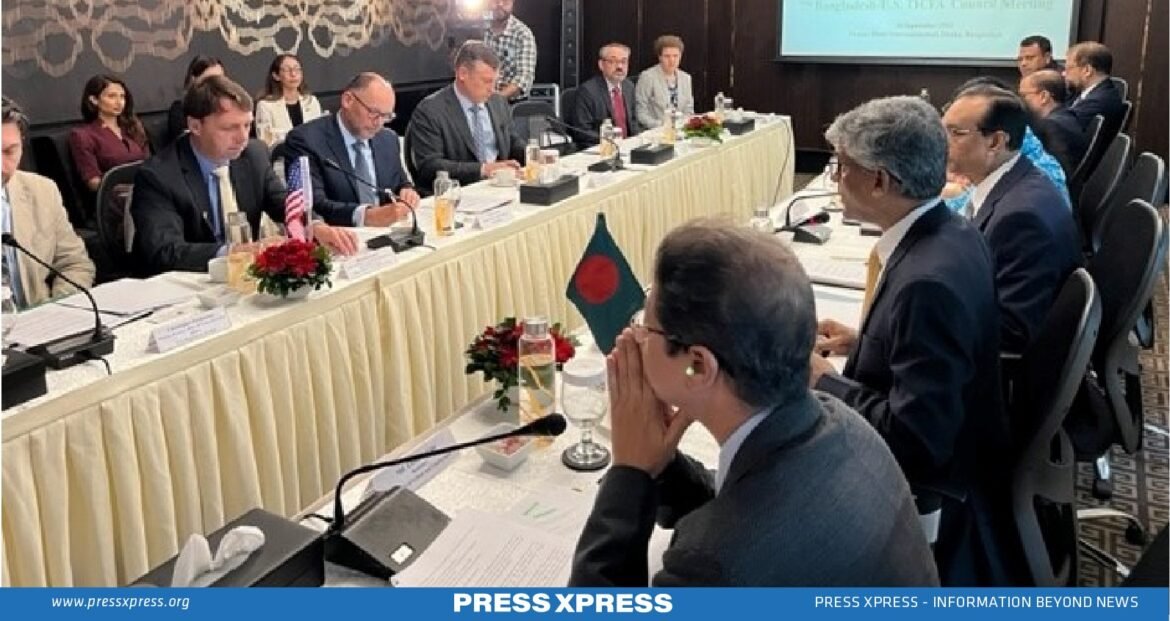The US is the largest cotton exporter, and Bangladesh is the second-largest ready-made garments (RMG) exporter globally. Last year, Bangladesh shipped garment products valued at almost $10 billion to the United States
The seventh round of discussions under the Trade and Investment Cooperation Forum Agreement (TICFA) took place on the 20th of September 2023 at Intercontinental Dhaka, Bangladesh. The TICFA has served as a platform for the United States and Bangladesh to identify and address various obstacles to bilateral trade and investment since its signing on November 25, 2013.
Bangladesh reiterated its request for duty-free access to the American market for its cotton-based apparel. Also, the government reasserted its position that tariffs should be imposed only on the value-added portions of their apparel exports to the US. Moreover, there was a conversation about the potential reinstatement of the Generalized System of Preferences (GSP) for Bangladesh, suspended in June 2013.
You can also read: GREATER MARKET ACCESS TOP TICFA AGENDA
The US delegation was led by Brendan Lynch, acting Assistant US Trade Representative for South and Central Asia, and the Bangladesh Delegation was led by Senior Commerce Secretary Tapan Kanti Ghosh.
Key Recommendations and Discussions
1. Tripartite Labor Law Review Committee:
The US delegation recommended that Bangladesh continue its efforts in reviewing amendments to the Bangladesh Labor Act (BLA) through the Tripartite Labor Law Review Committee. Labor reforms were a significant topic of discussion during the meeting.
The US emphasized the importance of workers’ rights, including freedom of association, collective bargaining in Bangladesh’s Special Economic Zones (SEZs) and the Export Processing Zones (EPZs), and combatting violence against workers and union organizers. This is a top priority for the Biden-Harris Administration.
2. Labor Rights and Workers’ Protection:
Recognizing Bangladesh’s efforts to address workers’ challenges during union registration, the United States underscored the importance of establishing an impartial trade union registration process that adheres to legal timelines. Additionally, the United States urged Bangladesh to enhance its commitment to labor inspections, enforcement, and the prevention of anti-union discrimination and other unjust labor practices.
3. Duty-Free Market Access for Apparel:
Bangladesh presented a fresh request for duty-free market access for apparel made from US-imported cotton. This request highlights the significance of trade in apparel between the two countries. The US is the largest cotton exporter, and Bangladesh is the second-largest ready-made garments (RMG) exporter globally. Last year, Bangladesh shipped garment products valued at almost $10 billion to the United States. Bangladeshi exporters are currently subject to a 15.62 percent duty on apparel exports to the US.
Dhaka approached the United States for assistance in endorsing the LDC Group’s proposal within the World Trade Organization (WTO). This proposal seeks to maintain access to the US market with duty-free and quota-free provisions, along with duty-free export privileges and TRIPS benefits, for an additional six years following LDC graduation.
4. Cotton Fumigation Requirement:
The US appreciated Bangladesh’s actions to remove the long-standing cotton fumigation requirement on US cotton exports to Bangladesh. This removal has been a matter of concern for over twenty years.
Bangladesh imports around 14 percent of its total cotton purchase from the USA. To sustain its RMG export industry, Bangladesh requires approximately 9 million bales of cotton each year. However, its yearly cotton production amounts to only 1.50 lakh bales, meeting just 1.6% of the total demand.
5. Agricultural Biotechnology Dialogue:
Both countries expressed their commitment to deepening their engagement in the agricultural sector. Bangladesh has expressed its interest in pursuing technical collaboration in the fields of biotechnology in agriculture, product diversification, and new investments, with a particular focus on the manufacturing sector, as well as high-tech areas such as the It sector and semiconductors.
6. Digital Trade and Data Protection:
Discussions included policies impacting the investment climate and digital trade, as well as Bangladesh’s Data Protection Act (DPA). Both sides affirmed their commitment to the protection of personal data and the growth of Bangladesh’s digital sector.
The updated version of Bangladesh’s DPA draft incorporates enhancements derived from previous iterations, including the elimination of criminal penalties, a more precise delineation of personal data, and a constrained application to companies processing personal data within Bangladesh’s geographical boundaries.
7. Intellectual Property Protection:
The protection and enforcement of intellectual property (IP) up to 2033 were recognized as essential for innovation across economies. The US expressed interest in engaging with Bangladesh on ongoing processes for amendments to IP-related laws and regulations including Copyright Act Amendments, Patent Bill, Industrial Designs Act and Implementing Regulations, and IPR Enforcement (Import and Export) Rules.
8. Counterfeit Clothing Concerns:
The US highlighted concerns regarding Bangladesh’s ranking as one of the top five source economies for counterfeit clothing globally, as noted in the USTR’s 2023 Special 301 Report.
9. Challenges faced by American Companies:
The US delegation raised concerns about American companies facing challenges in repatriating their profits from investments in Bangladesh due to the ongoing dollar crisis. This issue has affected US firms like MetLife Insurance, and other companies operating in Bangladesh.
Issues have also arisen with the US’s direct investment in Bangladesh, for non-adherence to digital trade policies like the draft Data Protection Act and forthcoming regulations for digital social media and OTT platforms by American businesses. Earlier this month, a few US investors in Dhaka met with the governor of the Central Bank and raised the subject to be discussed.
10. Bangladeshi Pharmaceutical Products:
Bangladesh expressed its interest in facilitating the registration of Bangladeshi pharmaceutical products in the US. The government also asked for financing from the US International Development Finance Corporation in Bangladesh’s energy sector.
Taking a Peek at the 6th US-Bangladesh TICFA Conference


Future Dialogue
Following the TICFA Council meeting, both delegations reasserted their determination to promote future bilateral trade and investment opportunities through continuous mutual engagement and technical work on the highlighted issue areas, among other priorities. The next TICFA Council Meeting is scheduled for 2024 in Washington, DC.
The United States displays a strong inclination to delve into the state of democracy and human rights in Bangladesh. Bangladesh is ready to provide a comprehensive and strong response, underscoring the significance of the forthcoming discussions.
Furthermore, the US Ambassador to Dhaka, Peter Haas, has expressed optimism about the prospect of rapid advancement in building bilateral trade and investment relations between Bangladesh and the United States. The meeting highlights the mutual commitment to navigating a path toward mutually advantageous economic cooperation.


